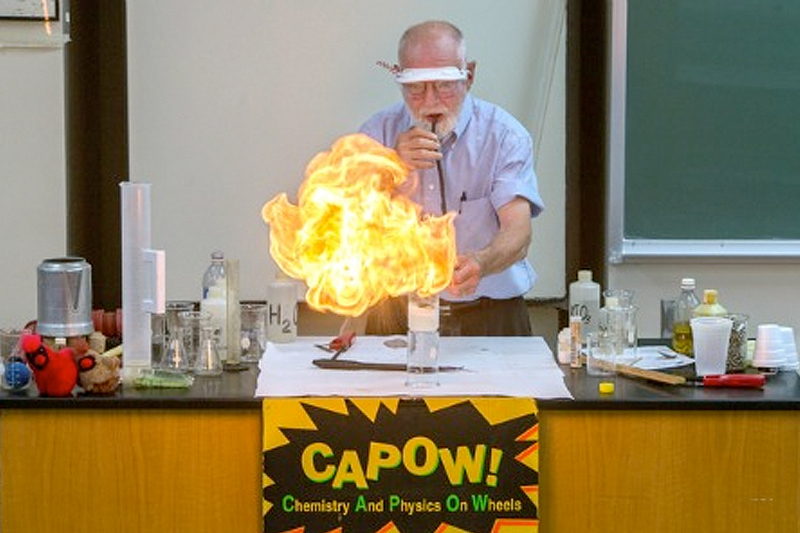Faculty Focus: Dan Sullivan
- contact: University Communications
- phone: 402.554.2704
- email: unonews@unomaha.edu
- search keywords:
- faculty focus
- kvno
- interview

OMAHA –
A new weekly program will feature educators from across the University of Nebraska system.
"Friday Faculty Focus with Brandon McDermott” airs each Friday at 7 a.m. and noon on all-classical 90.7 KVNO, a broadcast service of the University of Nebraska at Omaha (UNO).
On Friday, Aug. 12, McDermott debuted the program with a conversation with Dan Sullivan, UNO professor emeritus of Chemistry and lead demonstrator of the Chemistry and Physics on Wheels program, or "CAPOW" for short.
Listen to their conversation here, or read the transcript below:
Brandon: Dr. Dan Sullivan thanks for coming on the show here we appreciate it.
Dr. Sullivan: It's my pleasure.
Brandon: If we could start here, Dr., how has chemistry changed since you started out in the 50s and 60s?
Dr. Sullivan: We had a lot more basic approach to science in those times. We didn't have the instrumentation we have now and of course we didn't have computers. So it wasn't possible for students to make as many measurements or computations as they do now and we understand science quite a lot more. Back than we were really dealing with a lot of theoretical things and we get a lot of flame tests, lots of laboratory experiments lots of test tube experiments. Now you can do some of those experiments on a computer you can actually design the molecules you want to work with on a computer - even looking at biological compounds, you can think, "What's this have to be shaped like in order to work?"
Brandon: If you could talk real quick about the chemistry and physics on wheels or the ‘CAPOW’ program it you know how did that come about?
Dr. Sullivan: Sure, in the 1970s and 80s eighty's I was a pre-med counselor. With a pre-med club and a lot of students who wanted to go to medical school, I realized that the admissions committee needed to see that these students were really committed to helping other people. So we started a demonstrator program and advertise the local schools that we would go out and do a science program for them. I headed about half a dozen or ten pre-med students who would regularly go out to local schools elementary schools and do science programs interact with the children and give the children a chance to see some science in action. Tell them about their plans where they were headed.
Brandon: I have to tell you - I didn't end up in a science career so to speak but I recall being a fifth grader at Dundee Elementary in Omaha, in about 1997 or so, and the CAPOW program and yourself came up to our school, did all kinds of experiments - using dry ice, balloons, fire extinguishers and things like that. What does that do to stimulate or interest young kids and chemistry?
Dr. Sullivan: Well people remember a lot more what they see than what they hear. So, when a child sees a scientist do something they think ‘gee, I could do that.’ Particularly if they have a young woman scientist or if they have a minority student going along for a demonstrator this really impresses them they think gee I could be that.
Brandon: You've also had a hand in several STEM outreach projects as well. Why is science technology engineering and math so important for future generations?
Dr. Sullivan: Well it's going to be really important because robots are going to be able to do many of the menial jobs many of the rote jobs that we could do in the past. There is going to be a tremendous demand for educated people - people with a technical background or people with a skill set and many countries such as China and Japan are not producing the young people to go through to run their industries, to function in their manufacturing processes. There will be a tremendous demand for educated workers.
Brandon: And how did how did you teach chemistry to say non science majors as compared to students who were headed to medical school?
Dr. Sullivan: In almost every class I tried to do a ‘show and tell.’ In almost every class I tried to have something concrete for them look at, that we could discuss some machine or some process such as air conditioning that we could talk about. For the lower level classes we particularly paid attention to how is this going to work in your life? How is this going to make your car run better? How can you make your home run better?
Brandon: Is there anything else that you want to add before we go?
Dr. Sullivan: No, I think we’re pretty much set. Thank you for doing this.
Brandon: Dr. Sullivan thanks again for joining us.
Dr. Sullivan: You bet, it’s my pleasure.
Enjoy the interview? Watch Sullivan show off a CAPOW favorite on YouTube.
Listen Friday, Aug. 19, for a conversation with Jenna Yentes, who’s doing exciting research on COPD.
Want to be a future guest, or know someone who should be? Send an email to bmcdermott@unomaha.edu.